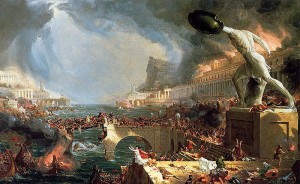
The Course of Empire by Thomas Cole
Here’s the thing. Our society only works after generational crises which don’t destroy it. After the Napoleonic Wars, the survivors made Europe more or less work. They got a good long run out of it–a surprisingly long one–but it began going south starting around 1870, and it blew up with WWII.
It went south in ways that are recognizable, by the way. For example, the British Empire pushed laissez-faire trade policies which made the rich richer, but gutted the British manufacturing base over time, moving much of it, ironically, to America.
The system went into crisis from 1914 to 1945, and the Americans took it over and ran it basically well up until the early 70s, about 25 years. Then it went into decline. It’s hard to tell exactly when the end-game crisis start(ed) until we can look back, but if we aren’t in it right now, we’re close.
1945 to 2008 is 63 years. If you count up through to today, it’s 71 years. If the crisis isn’t seen to have started for another ten years, it will be 81.
But the core point here is that it’s very hard to create people who can run a system.
A common refrain is that prosperity destroys character. But that’s not quite right: The people who created the good post-war economy were the FDR types, mostly. People who were adults in the 20s and 30s, who saw what went wrong.
People have a hard time learning from other people’s experiences. They have to see it themselves. So, in the early 70s there is an attempt to get rid of the short-sale uptick rule (you can only short a stock on an uptick of the stock) and it dies in the face of massive backlash. A couple decades later, those people are dead, and even more wholesale revisions to the rules are put in place to prevent another Depression. Finally, Clinton kills Glass-Steagall, the main spar, wholesale, something entirely unthinkable in 1960 when the population had lived through and remembered the reasons Glass-Steagall existed in the first place.
But the rot goes deeper than just, “It’s hard to learn what you didn’t experience.” It goes to the core of how we raise ourselves and our children.
School, as we do it, is a terrible way to raise people. What it actually teaches us is to, “Do what you’re told, when you’re told. Wait to be told how to do things, don’t figure out things for yourself, and give the approved answer, not one you came up with yourself.”
It trains drones. It trains people who are meant to spend their adult lives under supervision, doing what they are told, when they are told, and giving their bosses the answers their bosses want.
Those people make fine wage slaves, yes, but they don’t make good citizens. They have been failed to be taught how to think for themselves. Even worse, they have been taught that if a thought of their own should come up, they should keep it to themselves.
Meanwhile, school interactions with peers are terrible. When we call something “high school” we mean horrible peer pressure bullshit. A few people remember high school fondly, but most people remember it as one of the worst times of their lives.
Wage slavery, and I use the term slavery very deliberately, is a terrible system if you want a democracy or a Republic. Mass production consumer societies, in which we choose from menus rather than creating anything ourselves, are terrible for democracies or Republics.
The ways we school people, the jobs most people work at, and the methods through which we distribute goods to people (through money gained by sitting down, shutting up, and doing what you are told) are antithetical to free, egalitarian societies. Only a crisis which forces people to think for themselves and where they have to be trusted for a while can briefly create people suited to political freedom.
But we can’t have world wars and depressions all the time, for what I assume are obvious reasons. So we stagger along, brief good periods sliding into shit periods, regularly.
Of course there is more to it than this, such as cycles of destruction of capital and labor and so on, but much of that is manageable–in theory. It isn’t manageable in practice, not because it couldn’t be done, but because our society–we, ourselves–don’t create the people who can do it.
Freedom, democracy, equality: these things are not compatible with how we order our economic affairs, how we raise our children, or how we condition our adults.
We will not reverse course, this cycle; that doesn’t happen and it won’t. It’s too late. But there is always another cycle. If we don’t want the next cycle to be as disastrous as this one, we must figure out a better way to run our economy, to educate our children, and to live as adults. A way suited to people fit to be free.
This doesn’t mean “work or starve” as many libertarian morons would think; it means allowing real choices to be made, which requires an absence of existential fear while still including consequences. It means teaching children to to be something other than “good workers.” It means jobs that aren’t “you’re a kneepad for the boss or you lose everything.” It means a power structure that does not concentrate wealth and power in the hands of a few and create a gate around access to the good life, which fosters outside of it a subservience born of the desperate knowledge that the good life comes from good jobs, which are in scarce supply.
All of this is do-able. In some sense, most of it isn’t even all that complicated. But that doesn’t mean any of it is easy, and it is hardest because we have been trained to exist in a poverty of imagination, an inability to imagine worlds that are much better than the one in which we live.
We have the technology. What we don’t have is the people. We aren’t the people who can run a good society (this is obvious, as we haven’t).
But as people, we can re-create ourselves and our descendants. Biology is only half destiny, the rest is in our hands.
So far, we’ve been acting like bacteria in a petri dish, rushing to destroy our environment through unchecked, stupid growth.
Let us hope we can prove ourselves wiser than that. Or, instead of us instructing ourselves, Nature will instruct, and her lessons will be harsh.
The results of the work I do, like this article, are free, but food isn’t, so if you value my work, please DONATE or SUBSCRIBE.

 Article 50, which starts a two-year negotiating period, has been triggered. In principle, this is irrevocable, in practice, perhaps not so, but it’s hard to see May changing her mind.
Article 50, which starts a two-year negotiating period, has been triggered. In principle, this is irrevocable, in practice, perhaps not so, but it’s hard to see May changing her mind.